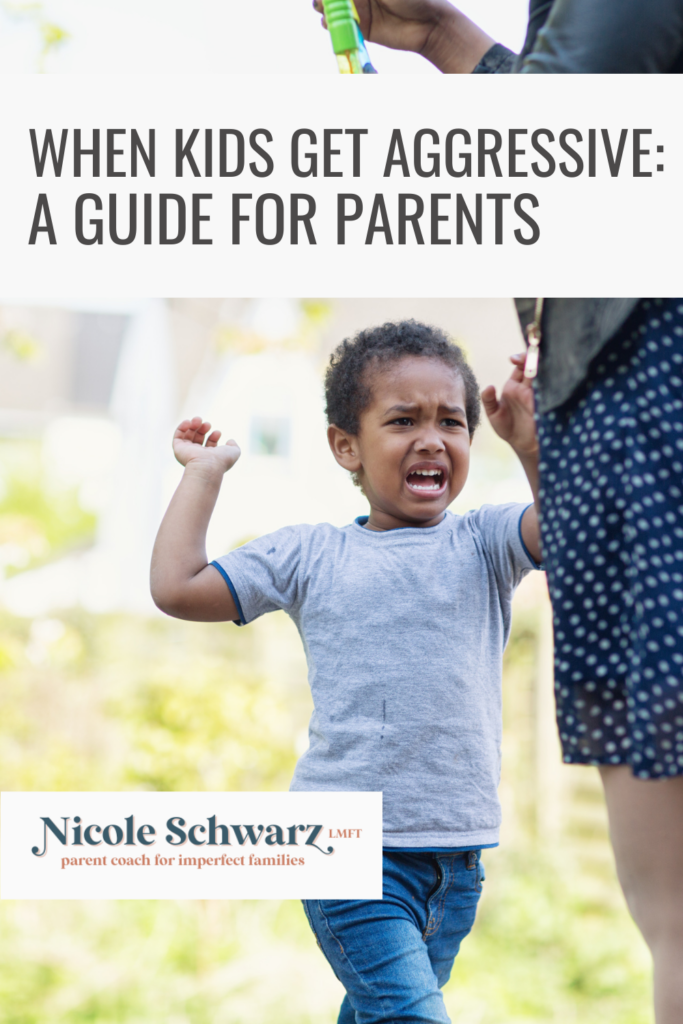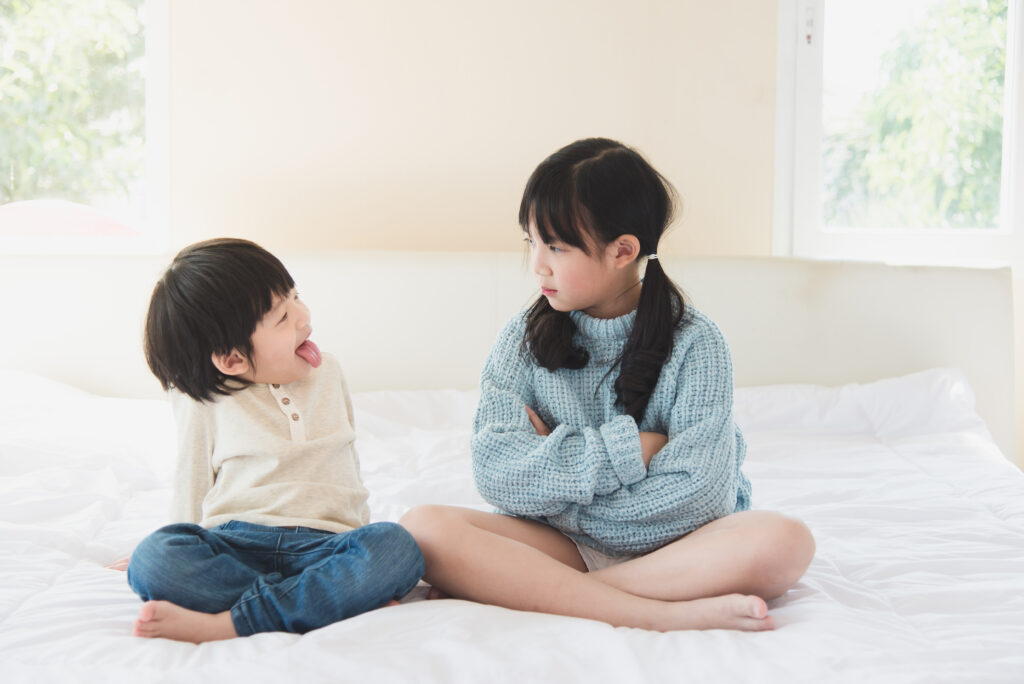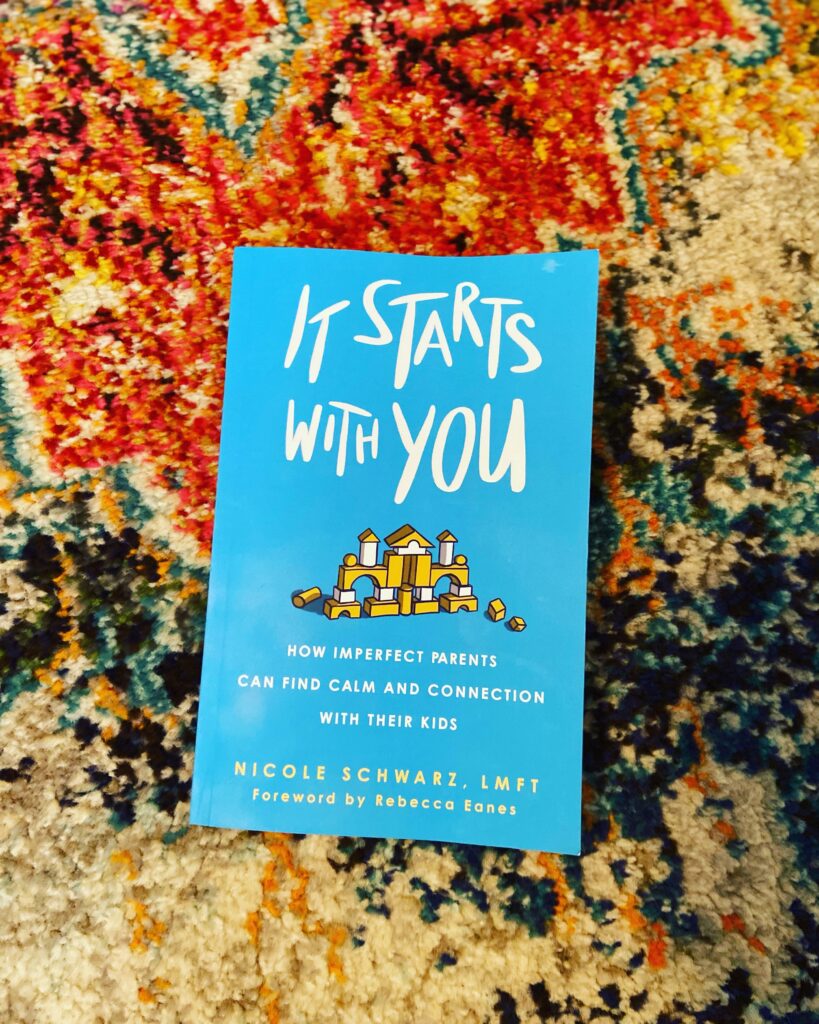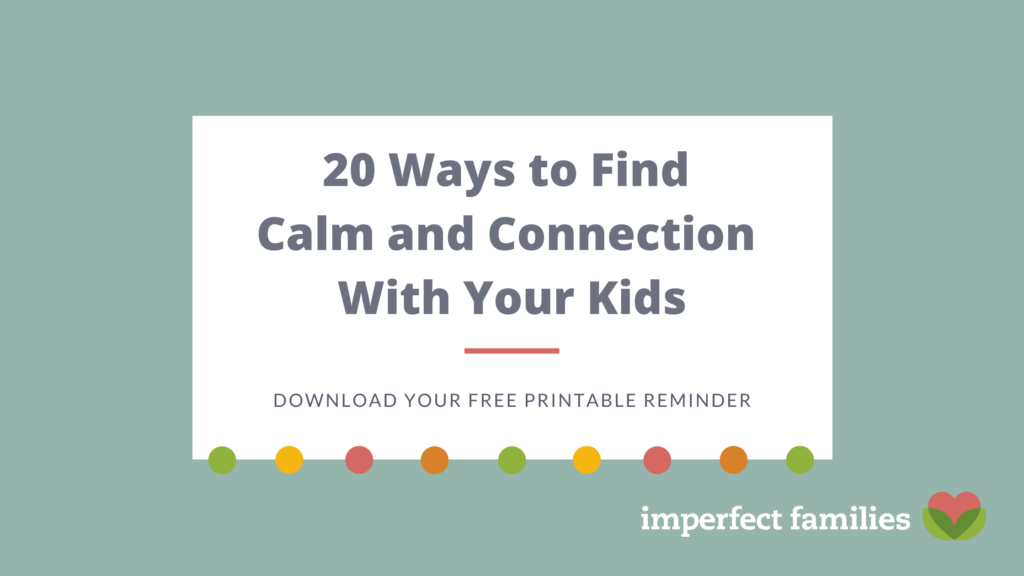Parenting a child who hits, kicks, bites, or hurts others can feel overwhelming and confusing. This guide will give you an overview of how to support your child when they are aggressive, and help them learn how to manage their big feelings without aggression.

“How can we get our 5-year-old to stop hitting?”
“My three-year-old kicks me, sometimes without warning!”
“I can’t leave my twins alone in a room for more than a minute before they start attacking each other!”
“My daughter is a great kid, but when she’s overwhelmed, she gets aggressive!”
If you can relate to these scenarios, you are not alone!
It’s alarming to watch our kids hurt their siblings.
It amplifies all of our emotions, leaving us feeling confused, concerned, and maybe even ashamed.
Aggression is very common, especially in younger children, because they are still learning the skills to work through big feelings and navigate tricky social situations in a different way.
We’ll learn more about how to support our growing and maturing kids, but first, let’s start with you.
Your Reaction to Aggression Matters.
Before we rush to find solutions, I encourage you to take a minute to pause and breathe.
Now, think about a situation where your child was aggressive towards another person. You, a sibling, a friend, a stranger.
What happens inside your body?
How do your muscles react? What is your instinct? Do you want to run away? Are you flooded with adrenaline, fists clenched? Does your heart race?
There is no right or wrong here, do your best to notice without judgment.
Next, what thoughts go through your mind?
How do you explain your child’s behavior? What story do you tell about them? What story do you tell about yourself as their parent? What fears do you have about your child, yourself, or your family?
Sometimes, it’s helpful to journal these responses. Sometimes, it’s helpful to talk about them with a therapist, coach, co-parent or close friend.
The goal is to be curious. To notice and name what is going on for you.
Aggression is a difficult thing to witness!
It is normal to have an emotional reaction. We are wired to be protectors and comforters. When these instincts are triggered, it makes sense that you would respond with big feelings of your own.
Your kids need you to lead your home with a calm confidence.
Which means, you may need to do your own work first. You may need to learn to calm your body, you may need to rewrite the story (telling yourself that your child is a good kid who needs support, instead of a bad kid who needs punishment). You may need to meet with a therapist to process old wounds. You may need a nap, talk to a friend, or finish the cup of coffee that’s waiting in the microwave from three hours ago.
Taking care of yourself is the first step to helping your child manage their big aggressive feelings.
You won’t do this perfectly, of course. You’re still human.
But, the long-term goal is to enter heated situations ready to be your child’s best ally. To help them find a different way to get through this moment without aggression.
It’s not easy. Be kind to yourself in the process of learning about yourself and how to stay present.
Be Curious About Aggression
Aggression is communication. If our kids had another way to express their feelings, they would.
When hitting, kicking, and biting show up, it is usually a sign that your child has moved beyond what they are capable of handling well, and into an area where they feel stressed or have immature skills.
Your kids are not bad kids for acting aggressively.
Your kids are dysregulated. They cannot communicate clearly. They cannot think of a better way to work through this difficult moment.
The “thinking part” of their brain is offline, and their “alarm part” has taken over.
Rather than focusing on the hitting, I’d encourage you to dig deeper into what may be going on for your child under the surface.
Examples of things that may lead to aggressive behavior:
- Feelings of anger, irritation, confusion, sadness, jealousy, excitement
- Feeling left out or needing attention
- Feeling bored or under-stimulated
- Trying to work out a social problem, but getting stuck when the other person refuses to change their mind or refuses to engage in problem-solving
- Trying to work out a social problem, but running out of solutions/things to try
- Trying to communicate something but being unheard or misunderstood
- Hunger, thirst, lack of sleep, feeling disconnected from caregivers
- Over-stimulation from sounds, lights, textures, smells, and expectations (this can compound over the day, so over-stimulation during the school day may show up in the afternoon or evening)
- Changes in routine, structure, environment, caregivers
This list is not exhaustive. Be curious about your own child. See the aggression as the symptom, not the problem.
After a difficult interaction, take a minute to pause. Ask yourself what was going on before the aggression started. Think about your child’s day, their sleep, if they’ve had a snack, etc. Who was with them and what was going on? What things did they try first? What was your response?
What helped? What seemed to make things worse?
Again, no judgment here. Just noticing so you can use this information in the future.
In the Heat of an Aggressive Moment
In a perfect parenting world, we would all take a minute to pause before we respond.
I realize I’m asking a lot.
It’s OK if this isn’t your go-to response right now, or if you are only able to do this some of the time. We’re all imperfect parents! We are all working and growing on ourselves right along with our kids.
Keep practicing, and give yourself lots of grace when things don’t quite work out this way!
When it comes to aggressive behavior, we often feel pressure to react IMMEDIATELY!
I understand this reaction, especially if someone is going to get hurt.
But, I’m still going to encourage you to pause and breathe because your reaction matters! Taking a split second to breathe may be all you need to enter the situation with a calm confidence – rather than the alternative – yelling, overreacting, threatening!
If it helps, remind yourself, “this is not an emergency.”
Remember, the hitting is the symptom, not the problem. Your child needs your help: to get back on track, to manage the situation better, to communicate their needs, to problem-solve, or simply for you to see their big feelings.
Narrate what’s Happening
When you’re ready to enter the room, state what you see happening:
“Woah, I see two boys fighting over the remote.”
Set boundaries for safety while continuing to narrate.
“OK. Hold on, I’m here to help. First, we have to stop kicking each other. Ash, come sit over here. Bodhi, you can be over here. Alright, we will figure this out.”
Sometimes, this means sitting between them. Sometimes this means holding your child’s hands so he cannot continue to hit. Sometimes, this means moving one child into another room, especially if they are not able to calm down with their sibling nearby.
If you do remove a child, continue narrating, “We’re going to the kitchen to calm down. I’m going with you. I know this is hard. I’m here to help. We will get through this.” Rather than seeing this as a punishment, we want to remind them that we are on their team. That they are not a bad kid and that we are not leaving them alone in these big feelings.
If the aggression is towards you, you may say, “Your hitting tells me how unhappy you are with my decision. I really want to hear you. And I will not let you keep hitting me. I know you feel like hitting and I know we can work this out, but we need to get our bodies calm first.”

Watch your Language about Aggression
When we are upset, the words we use often do more harm than good.
Here are a few alternative phrases to try:
Instead of: “How dare you hit your brother! Hitting is wrong and you know it!”
Try: “I’m going to stand here so you do not hit your brother.”
Instead of: “When will you learn?”
Try: “I’m here to help.”
Instead of: “Go to your room!”
Try: “I can see how upset you are. Come here, tell me about it.”
Acknowledge Big, Messy Feelings
Since aggression is communication, there are usually many feelings fueling their behavior.
Do your best to put their feelings into words.
“It looks like you had trouble figuring out who was going to pick the show.”
“You aren’t ready for bed.”
“It’s so hard when your sister has a friend over and you don’t.”
“This is really, really disappointing.”
“You are SO MAD!”
“It’s been a long day. You’re exhausted.”
“This lego building didn’t work out how you wanted.”
Pause and Breathe
Sometimes, nothing we say or do helps our child calm down. They continue hitting. They yell, “I’m not angry!”
It’s confusing and exhausting.
Rather than feel the need to do *something* – pause.
Even if your child refuses to breathe, do your own slow inhales and longer exhales. Remind yourself that you are a good parent and that you have a good child who is having a hard time. Even if you don’t feel confident, know that the two of you will get through this together.
There is a lot of pressure to find solutions, give a punishment, or teach lessons in the heat of the moment.
Instead, I give you permission to wait until the dust settles before you move on.
What your child needs most at this moment is for you to calm your own emotions, so you can help them calm their emotions.
Sometimes, this can happen immediately.
Sometimes, it takes 20 minutes before you or your child can come back to calm.
You are not doing something wrong if your child refuses to breathe with you, or if they try to reach around you to get one more swipe at their sister.
Your child is showing you just how dysregulated their little body and brain is right now.
If they could do better, they would, but right now, it’s still really difficult.
Connecting With Aggressive Kids
This is the part where parents ask, “OK, but what do I do now?”
Traditional parenting strategies may dole out a consequence, take away screen time, send them to timeout, or give a spanking as a next step.
Instead, I would encourage you to connect with your child.
“What? Right after they hit their sibling?!”
Yep.
At this moment, what your child needs most, is to remember that they are loved. They need to be reminded that you are in their corner and that they can rely on you when these big (often scary!) feelings come up again.
When our kids feel connected to us, they are more willing to listen to our guidance. They are less resistant and more open to feedback.
Your child is unique. They may have a unique way of connecting with you.
Some kids love cuddling. Some need space before they are ready for a hug. Some kids love playing games or running around. Others need to be quiet. Think about what feels connecting to your child.
We can focus on teaching after connection.
There is time! Don’t rush this step.

Teaching a Lesson After Aggression
If you see aggressive behavior as a symptom, you may start to see patterns.
Maybe your child struggles to share. Maybe they have a harder time when you are making dinner or on the phone. Maybe they really want to play with their sister, but their sister doesn’t always want to play.
These are the things we want to teach. This is where you want to focus your energy.
Teaching will look different at different ages.
When our kids are young, they need more hands-on intervention. They do not have the language skills to “use their words” and they do not have the maturity to work through complex situations without an adult’s help.
If your toddler or preschooler is struggling with aggression, you may be unable to leave them alone for more than a few minutes without supervision.
Your focus will be on modeling the vocabulary you want them to use, practicing social skills using role play, songs, being silly, and giving them opportunities for a “do-over” whenever possible.
As your kids grow, they can do more processing with you.
Your older kids may need a lot of hands-on support initially, but as they learn more skills, you can back off and let them step into the problem-solving role.
You can expand conversations to cover a wider range of feeling words, giving them opportunities to talk about specific emotions, how it made their body feel, and exploring ways to manage these big feelings when they come up in the future.
You can continue to role play and allow lots of “do-overs” so they can practice. (Many kids older still love playfulness and silly songs too!)
Please remember, no matter how old your child is or how much practicing you do, they still may fall back on hitting if they are dysregulated.
It doesn’t mean you’ve failed!
It may mean you need to go back and be curious. You may need to provide more supervision. You may need to review skills for working through conflict.
Or, you may need to remind yourself that your child is learning and growing. And there’s still more learning and growing to come!
If your child is struggling to keep their hands and feet to themselves in all situations – at school, on the bus, in the grocery store – it may be time to seek out support from a mental health professional, occupational therapist, or medical doctor. Some kids need support beyond what we are able to offer, and that’s OK!
Yeah but…
What about the sibling who was hit?
In a sibling situation, start by making sure both kids are seen and heard.
The child who is doing the hitting needs to have clear boundaries set around safety. The child who is being hit needs to know you will work to keep them safe. And both children need to know that you understand their distress and are there to help.
Then, recognize that both kids need to work together to solve the problem. It’s not just that one kid needs to stop hitting.
It’s that both kids need to learn to work through conflict well.
This can be a tricky thing to teach, and again, it will depend on the age and developmental stage of your children.
So, let’s imagine your kids are fighting over the remote.
You might say, “Anna, you said it was your turn. And Luca, you said it was your turn. Huh. How do we keep track of turns?” And then expanding the conversation, “So, what can we do when we don’t remember whose turn it is?”
Or, “Anna, you didn’t want to give up the remote, huh? Why not? Oh, Luca didn’t ask nicely? It sounds like nice words are important to you. What words were you hoping to hear?” And then, “Luca, you tried to say those words but Anna didn’t listen? Hmm. This is a tricky situation. What can we do when someone doesn’t hear what we’re trying to say?”
When your kids are little, they will need you to do the talking and problem-solving for them, but don’t underestimate a young child’s ability to learn how to work through challenges! Give them plenty of opportunities to practice.
Aggressive behavior may be the loudest and scariest, but it doesn’t have to be the only thing we focus on.
We can teach both siblings communication, social skills, sharing, and problem-solving. As well as listening, empathy, feeling identification, and strategies to handle the ups and downs of living with other (imperfect) humans.
It may feel like a lot, but it doesn’t need to be done immediately.
Breathe.
Give yourself permission to start the process today, and then, take it one sibling squabble at a time!
Reflection Questions:
- What comes up for me when my child/children are aggressive?
- What fears impact my response?
- What situations or emotions are difficult for my child to manage well?
- What skills do I want my child to learn?




Comments have been turned off to retain the privacy of all families. If you have a question or comment on the topic, you're always welcome to contact me.